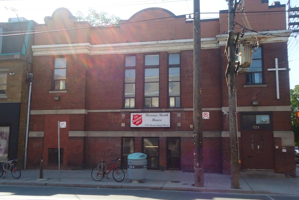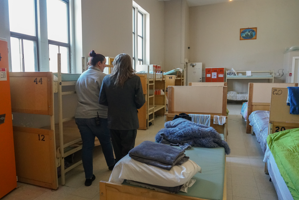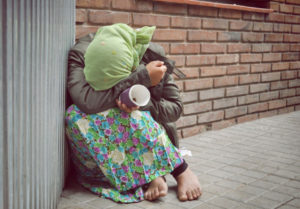Our Story
Florence Booth House was founded in 2000 when the City of Toronto asked The Salvation Army to provide an interim (6-9 months) shelter for women experiencing homelessness. With over 100 years of experience providing compassionate care for people in need, The Salvation Army has long been one of the City’s most trusted partners. The idea was to find a temporary space until the need subsided and The Salvation Army was able to assist.
We owned a vacant church located at 723 Queen Street, just west of Bathurst, and quickly re-purposed the building as a shelter for women with 64 beds. In 2024, we temporarily relocated from Queen Street to 66 Norfinch Drive during renovations on the property.



What started as a temporary solution has become an integral part of the social safety net in Toronto serving approximately 400 women experiencing homelessness every year from ages 16 and up.
In addition to providing the basics of life, Florence Booth House offers a range of programs and services including links to community resources which are key to helping women get back on their feet again.
Throughout their stay, Florence Booth House provides compassionate care and unconditional support using a holistic approach that encourages each woman to maximize her individual potential in all areas of life – body, mind and spirit.
Women and Homelessness
Mention homelessness, and most Canadians think of a bundled man sleeping on a heating grate. The reality, however, is far more complex. As of 2018, there were an estimated 8,715 people experiencing homelessness in Toronto. Approximately 42% of this population were women, meaning there are currently around 3,600 women without permanent shelter in Toronto. This is approximately double what was recorded in 2013, when only 1,800 women were experiencing homelessness.
 Women experiencing homelessness are a particularly vulnerable group. On the streets, they are at great risk of physical, emotional and psychological harm. They live with higher rates of chronic health conditions, acute illness and mental health issues compared with male homeless. To make matters worse, sleeping on the streets is a virtual guarantee of experiencing sexual assault.
Women experiencing homelessness are a particularly vulnerable group. On the streets, they are at great risk of physical, emotional and psychological harm. They live with higher rates of chronic health conditions, acute illness and mental health issues compared with male homeless. To make matters worse, sleeping on the streets is a virtual guarantee of experiencing sexual assault.
The causes of homelessness are complex but low income, lack of affordable housing and insufficient social supports are key factors. Women most vulnerable in these areas are at greater risk of becoming homeless. At-risk groups include young women, single (unattached) women, single mothers, women without a high school diploma, women with mental health and addictions issues, First Nations and Metis women, refugees and those with precarious immigration status, and increasingly, older women with dementia.
The risk increases when jobs are hard to find, incomes fall, and a city’s stock of safe, affordable and supportive housing is low-conditions currently at play in Toronto.